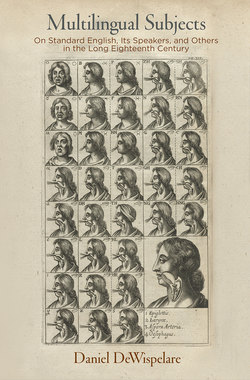Multilingual Subjects

Реклама. ООО «ЛитРес», ИНН: 7719571260.
Оглавление
Daniel DeWispelare. Multilingual Subjects
Отрывок из книги
Multilingual Subjects
On Standard English, Its Speakers, and Others in the Long Eighteenth Century
.....
A few more terminological points are in order. From this point onward, I will use different terms to refer to anglophone difference in lived reality and anglophone difference in text. With regard to spoken language, I use a term culled from sociolinguistics: “lect,” that is, a form of speech with no value attached. By contrast, in order to discuss the imitation of lectic speech in writing as a literary device, I use terms like “acrolect,” “dialect,” “ethno-lect,” “chronolect,” “regiolect,” “sociolect,” and so forth. My specific literary claim throughout this book is that dialect is not an actually existing set of interactional protocol in the social world that can be transparently represented on the page. Instead, dialect as we should understand it in literature is, to paraphrase Wordsworth, the written imitation of half created and half perceived linguistic attributes, attributes that are called on to signify linguistic and extralinguistic alterity.
Deleuze and Guattari’s dynamic description of language as a rhizomatic system also provides a conceptual model for understanding power relations that work to conceal the multilingual complexities of a linguistic system like anglophony. They write, “Il n’y pas de langue-mére, mais prise de pouvoir par une langue dominante dans une multiplicité politique. La langue se stabilise autour d’une paroisse, d’un évêché, d’une capitale. Elle fait bulbe. Elle évolue par tiges et flux souterrains, le long des vallées fluviales, ou des lignes de chemins de fer, elle se déplace par taches d’huile.” (“There is no mother tongue but instead a power seizure by a dominant language within a political multiplicity. Language is stabilized around a parish, a bishopric, a capital. It bulges. It progresses by way of stems and subterranean flows, along river valleys or railroad lines; it spreads like an oil stain.”)39 In this short passage, the writers overturn commonplace notions of language as a system of filiation where one self-contained tongue naturally gives birth to another and where each gains cultural and political power according to the logic of natural selection. When we think without the profitable pretense of a nationally sanctioned “mother tongue,” as Deleuze and Guattari suggest we should, then it is easier to see historically contingent usurpations of linguistic and cultural authority that have always been carried out in loci of power like parishes, bishoprics, or capitals. Armed with the powers invested in these and other institutions, a dominant dialect or acrolect seizes power. Deleuze and Guattari offer nonessentializing ways to think of language as a space of lateral linguistic mixing and nonhierarchical cross-pollination. Their emphasis on contact and contingency helps reveal the complexity of eighteenth-century anglophony even if power relations try to occlude it.40
.....